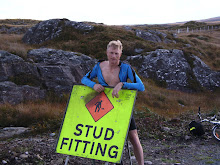Is it the nature of French roads and signage? Is it our bike-brained inattention to detail? Is it our guides’ willingness to wing it with the route maps?
These factors may be at work but none of them are adequate to describe our condition. They just don't stand up to close inspection. French roads do sometimes follow medieval logic and sometimes the numbering system changes unpredictably, but the roads generally have signs pointing to nearby towns at every intersection, and surely they do nothing we don't see regularly in Atlanta. The Boyz are astute, techno-savvy, travel veterans, and many of us study maps diligently and carry iPhones and Garmins and have a sixth sense about direction. It couldn't be us. Our guides LIVE in Europe, for pete’s sake, and speak 5 languages and travel these areas every year and have Tom-Toms in their vans. And yet, we keep coming to intersections and being thoroughly stumped! Do we turn left or go straight?
We ARE doing better than last year, as we haven’t been lost for more than 45 minutes in France. We wandered for about 1:15 hrs. last year in Interlochen, Switzerland. Guide Mike typically goes ahead and marks intersections with chalk arrows, which works well 1) if he knows the way and 2) now that his arrows are more consistent. His early arrow attempts were described by one cyclist as “flailing octopi.”
In order to make sense of all this, I’m playing with the hypothesis that a certain amount of “lostness” is key to the zen of cycling. If every climb is exactly the steepness and length described, and every route map is pre-determined with turns properly located, and every town is arrived at on the hour planned, cycling tends to repetitiveness and predictability, and then it feels less wild and free. It’s the possibility of lostness that gives us the space to feel our freedom and to practice our self-reliance.
If this hypothesis fails, I'm left with falling back on the old yin/yang argument: how will a cyclist know the joy of found-ness if there is no lost-ness?





No comments:
Post a Comment